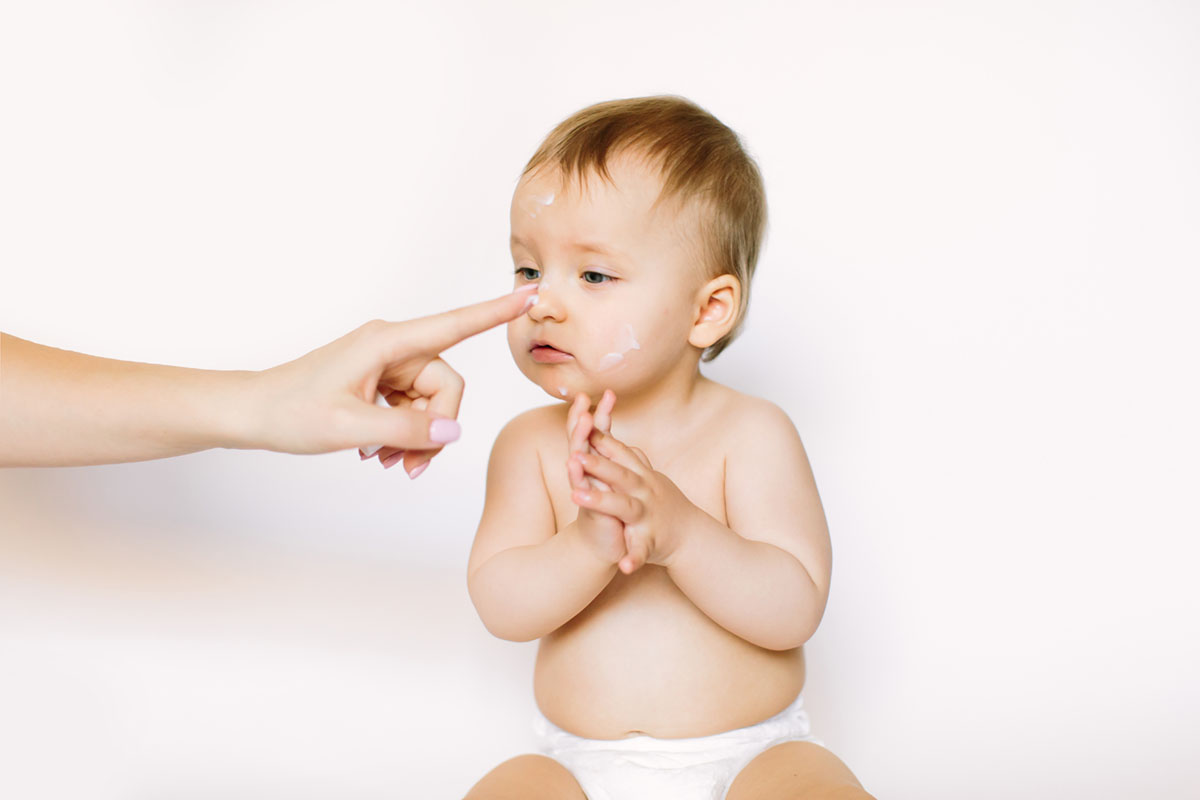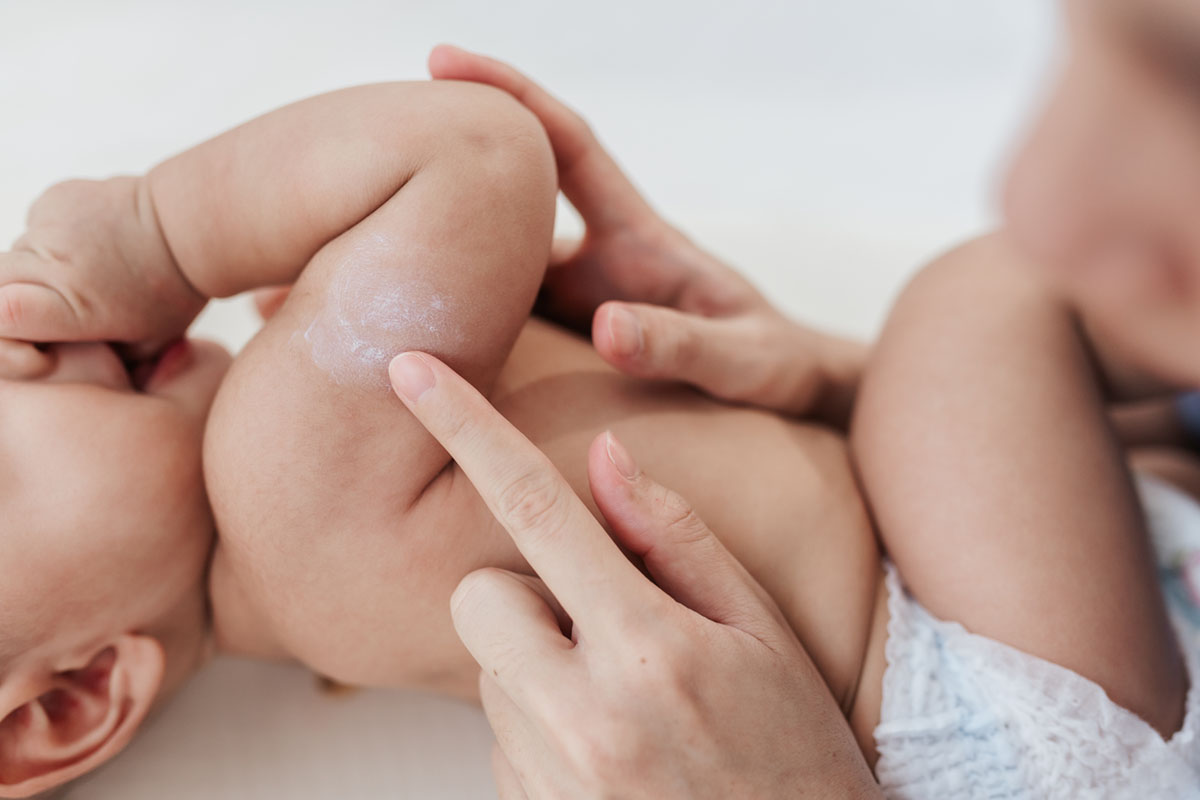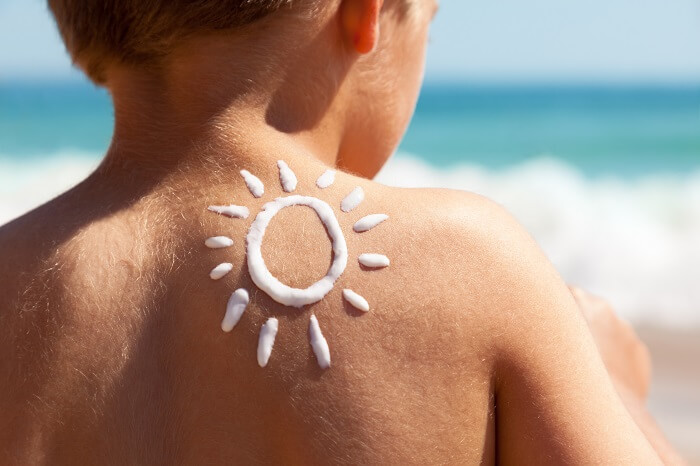Skin Care for Babies and Newborns
Why delicate baby skin requires special attention
"As soft as a baby's bottom" – this is a common saying. Indeed, your baby's skin is incredibly delicate, making it particularly sensitive. While your child was protected from external influences in the womb, after birth, their skin must adapt to deal with cold, pressure, or friction. This adjustment takes some time.
Therefore, you should handle your baby's skin gently when dressing, moisturising, or washing them. The right skin care for babies and newborns can support your little one's skin in its healthy development.
Skin care by Linola
Linola for babies and children
Finding the right skin care for babies
What do you need for baby care?

If you've already browsed the retail stores, drugstores, and pharmacies for baby and child care products, you're familiar with the packed shelves lined with numerous products. Among the most well-known are baby oil and gentle shampoos, as well as special shower or bath additives for children, and nappy rash creams to protect sensitive or stressed skin areas.
What products do you need for the skin care of newborns and babies? Don't be overwhelmed by the vast array of baby care items available. Naturally, you want to do the best for your child and use products that are suitable for babies. But rest assured; a baby with healthy skin doesn't need a cupboard full of special cosmetics. A selection of the most essential products for every need is entirely sufficient.
- To prevent and possibly treat early signs of rash in the nappy area, you should always have a high-quality nappy cream at home. It forms a protective layer on the skin, shielding it from irritations caused by nappy friction, faeces, and urine.
- Since a baby's skin can dry out quickly, it's recommended to regularly moisturise with a baby lotion tailored to the skin texture of the little one.
- If your child comes back dirty from the sandbox, a soap-free shower gel and gentle shampoo specifically for children should be used to avoid harming the delicate skin.
What to look out for in baby care?
Fragrance-free is a good choice
If your child has problematic or dry skin, special care is essential. However, be discerning when purchasing: many products contain ingredients that are unnecessary or could even harm baby's skin in the long run.

"I recommend paying attention to well-tolerated ingredients when choosing care products for babies and children. Furthermore, they should be free from mineral oils, fragrances, silicones, and microplastics."
Edith Janzen, Midwife at the Birthing Centre Bielefeld, Germany
Therefore, choose a skin care product that avoids mineral oils. For environmental reasons, silicones and microplastics should also not be present in baby care products.
As pleasant as many products for children may smell, (artificial) fragrances can sensitise and potentially trigger allergies. Hence, it's preferable to opt for fragrance-free products.
When bathing, be mindful that bath additives are not necessary and soap can dry out the skin. Soap-free shower gels specifically designed for children's skin are better. Especially for babies, ensure they are not bathed too frequently as this can impair the natural acid mantle of the skin. Warm water and a washcloth are often sufficient.
Baby care for specific body areas

- The bottom should be gently and frequently cleaned, preferably with a soft washcloth and clear lukewarm water.
- For a sore baby bottom, barrier creams that allow the skin to breathe can help.
- Ears have a self-cleaning function and should be cleaned gently without inserting cotton swabs deeply.
- Nails should be cut carefully and not too short, best done when the baby is asleep.
- Hair can simply be washed during bathing; shampoo is not necessarily required.
- For sticky eyes after sleeping, breast milk can help dissolve the stickiness and has anti-inflammatory properties.
- Baby's skin folds, especially around the neck, behind the ears, under the armpits, and in the groin, should be cleaned regularly and patted dry to prevent skin inflammations.
- For boys, the foreskin should not be pulled back as it is typically adhered to the glans during the first two years of life.
Baby Skin and Adult Skin
Differences and Similarities
Just like in adults, baby skin is composed of three layers:
- The outermost layer is theepidermis. In this layer, the natural skin barrier forms. This barrier is crucial to prevent excessive moisture loss from the skin and uncontrolled penetration of harmful and irritating substances into the skin. The outermost layer is sealed with a film, the so-called protective acid mantle.
- Beneath it lies the dermis, also known as the "dermal layer". It represents the thickest skin layer. Most physiological processes occur in this layer: perception of stimuli, inflammatory reactions. Moreover, this skin layer houses the hair follicles and sweat glands.
- Thesubcutis also protects deeper layers of the body. It contains connective tissue filled with fat cells.
Why Baby Skin is More Sensitive than Adult Skin
Each individual skin layer in adults is significantly thicker than in babies – overall, you have skin that's about five times thicker than your newborn's. The thinner baby skin is much more sensitive to stimuli such as pressure or friction.
You may have noticed that your baby doesn't sweat or sweats very little. This is because the sweat glands are not yet active. For this reason, a newborn's skin initially has a neutral pH value of about 6.5 – over time, this becomes slightly more acidic and, like adults, settles at 5.5. The acid mantle in your baby is weak and more prone to disturbances. The sweat and sebaceous glands, which form this mantle, don't fully function until around the age of 12.
Furthermore, baby skin doesn't produce melanin in the early stages of life. Melanin is a natural pigment that acts as the body's own sun protection, causing our skin to tan when exposed to sunlight. All of this develops within the first few years of life.
All these differences, which make your child's skin so soft and unique, can also be reasons why it's prone to dryness and irritations. The baby's thin epidermis can quickly absorb moisture. However, it can lose this moisture just as quickly. To support it, regular and moisturising care is required.
Linola Baby & Kind
Content verified by

Content verified by: Edith Janzen
Edith Janzen has been a midwife at the Birthing Centre Bielefeld in Germany since 2012 and is a mother herself. Her areas of expertise include out-of-hospital obstetrics, prenatal care, and postnatal care. She supports numerous families from the beginning of pregnancy through childbirth to the end of the postpartum period, providing advice and assistance during this special phase of life.
Additional topics & information
All about child and baby care

Moisturising Your Baby – What Matters in Baby Skin Care
To moisturise your baby or not? This question can't be answered broadly. What's certain is that baby skin is much thinner than that of adults and therefore needs special protection. Here, you'll find tips on what to consider for baby care.

Dry Skin in Babies – Causes and Skin Care Tips
Dry baby skin is more common than you might think and is harmless in most cases. However, the dry areas can cause itching, potentially affecting the baby's comfort.

Sun Protection for Babies and Children – Tips for Parents
The skin of babies and children reacts particularly sensitively when exposed to the sun without protection. Sun protection involves more than just sunscreen. Here, parents can find tips on what matters when it comes to protecting babies and children from the sun.




